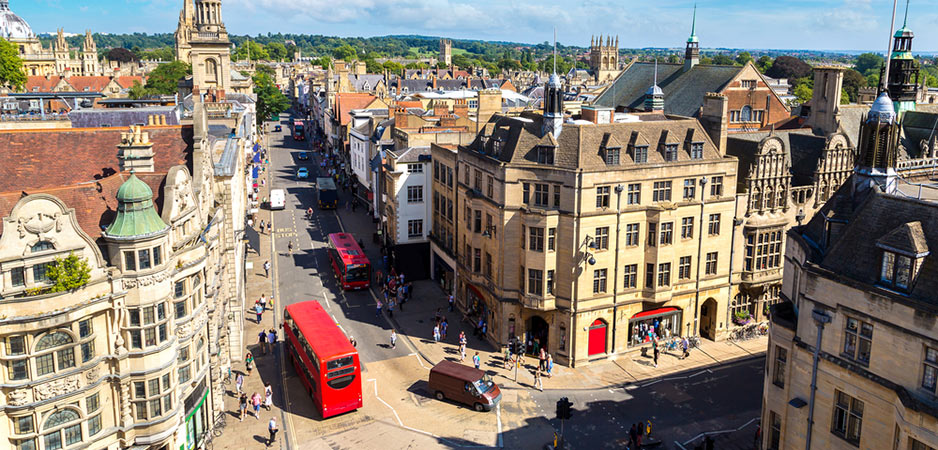In an op-ed published by The Guardian, the Zimbabwean scholar Simukai Chigudu, an associate professor of African politics at the University of Oxford, defends the Rhodes Must Fall (RMF) movement. RMF seeks the removal of a statue in Oxford of Cecil Rhodes, the diamond mining magnate and imperialistic plunderer of South Africa.
Rhodes knew how to use his ill-gotten gains to buy a lasting reputation as a philanthropist, notably as a benefactor of Oxford University. His estate created a fund for the prestigious Oxford scholarships that bear his name. In his lifetime, Rhodes made his philosophy clear: “I contend that we are the first race in the world, and that the more of the world we inhabit the better it is for the human race.”
Emmanuel Macron’s Campaign to Stifle Debate in France
After RMF was launched in 2015, Oxford University’s chancellor, Lord Patten, lost no time reacting. Aware of the danger of defending a noted white supremacist, Patten called to the bar the perfect witness to support his opposition. “If people at a university aren’t prepared to demonstrate the sort of generosity which Nelson Mandela showed towards Rhodes and towards history … then maybe they should think about being educated elsewhere,” he said in 2016.
Here is today’s 3D definition:
Generosity:
The spirit of giving freely without asking for anything in return, a virtue that the wealthy and privileged particularly appreciate seeing in the behavior of the poor and powerless, while at the same time protecting their wealth and power
Contextual Note
In an article for The Times Higher Education in 2016, Natasha Turner wrote: “Lord Patten said that he was happy to debate and discuss ideas but pointed out that there were buildings at Oxford, other UK universities and many British cities that had been funded by people and activities — like the slave trade — that were now rightly considered abhorrent.”
Close reading reveals how obtuse Lord Patten’s thinking on this question appears to be. Whenever a powerful person claims to be “happy to debate and discuss ideas but…,” the word “but” should be read to mean that, in fact, there is no discussion possible. Translated into a more vulgar idiom of English, it means: Shut up and enjoy your privilege!
In the word “funded,” Patten’s reasoning becomes clear. He assumes that we all agree that universities and cities are admirable pillars of civilization. Oxford, in particular (full disclosure: I am an Oxford alumnus). Our shining cities and great universities exist thanks to the Cecil Rhodes of this world who funded them. Because we deem them good, the funding that built them must be considered good, even if the money used to fund them was dirty.
Although Patten acknowledges the link to the now-universally abominated slave trade, Patten implicitly dismisses it as irrelevant. His privileged idea of the logic of history and his moral relativism become evident when he says Rhodes’ actions are “now rightly considered abhorrent.” This presumably means that they were less abhorrent in the past. Morals change over time.
But there is a serious flaw both in Patten’s reasoning and his sense of history. In whose eyes does he believe such things were not abhorrent in the past? The answer can only be those in power, people like Cecil Rhodes. Both the powerless themselves and conscientious moralists among the powerful — such as abolitionists — clearly found them abhorrent. In 1785, a full century before Rhodes, the poet William Cowper wrote this line in his poem, The Task: “We have no slaves at home.—Then why abroad?”
Patten implies that the opinion of the powerless never counts. Why? Because they were not the “makers” of history. All reasonable people, in his eyes, align with the values of the powerful. Or if they don’t, they simply shut up. Here is Rhodes’ idea of the world order to which we are invited to give a pass: “We must find new lands from which we can easily obtain raw materials and at the same time exploit the cheap slave labor that is available from the natives of the colonies. The colonies would also provide a dumping ground for the surplus goods produced in our factories.”
Fast forward to today. Patten has adopted a more aggressive argument to excoriate the anti-racism protesters at Oxford. The Telegraph reports that the chancellor “claimed there was ‘hypocrisy’ among critics of the statue who had also benefited from Rhodes scholarships.”
It’s the good old “don’t bite the hand that feeds you” argument, one I heard myself in the common room of my college expressed by a right-wing college mate back in the days when apartheid still reigned in South Africa and “the Troubles” were raging in Northern Ireland. With a complicit smirk he told me: “Admit it. You’re only here to be part of the elite.” (I didn’t admit it because I was too naive to understand the interest of being part of the elite.)
Patten is reminding the Africans in Oxford that it was Rhodes who paid for the ticket permitting them to join the elite. And it’s true that many see Oxford, Cambridge, Harvard, Princeton and Stanford as launching pads for cushy positions among the Western elite. Personally, my own motivation was closer to the great 14th-century poet Geoffrey Chaucer’s description of the “Clerk of Oxenford,” whose means were limited and whose motivation was little more than this: “gladly would he learn and gladly teach.”
Historical Note
In the Roman Catholic Church, the sacrament of confession plays a crucial role in defining the individual’s relationship with the moral universe (God) and the ecclesiastical community. The theology of confession requires three acts: the voluntary admission of one’s sins; penance, or the execution of specific acts assigned by the confessor, from prayer to pilgrimage; and, when appropriate, restitution, as in the case of theft.
The Western world is only just beginning to consider making its confession for massive crimes of injustice, racism, genocide and the economic exploitation that accompanied them. Those centuries of exploitation are clearly tantamount to theft.
Western civilization finally appears to be acquiring a grudging acceptance of the idea that our ancestors committed unjust actions facilitated by a racist ideology. The need to formally confess it is approaching. We have begun whispering our doubts and suspicions to ourselves, wondering how ashamed we should be. But we’re not quite ready to enter the confessional. Admitting the injustice and racism of our ancestors in the past may be the easy first step. Penance will come later. For the moment, admitting our shame may help us feel honest and enlightened, proud to feel ourselves better than our ancestors.
But the wealth and privilege we enjoy today would not have existed without centuries of exploitation. Are we like the thief who stole a car and feels remorse for the act but, accustomed to driving it, now expects to keep the car after shedding the guilt through confession? This raises the uncomfortable issue of reparations, an issue occasionally mentioned in the US before being pushed aside. It’s a question that concerns the entire Western world.
The idea of reparations poses many problems. The first is evaluating the cost, which is bound to be extravagant. Another revolves around the question of determining to whom the reparations would be paid and in what form. Yet another concerns the need to avoid the danger of concluding that once reparations are paid out, we can return to business as usual, this time with a slightly wealthier caste of second-class citizens, who no longer have the right to complain.
In a culture built on the principle of a collection of individuals each seeking profit for themselves, the idea of generosity has lost its meaning. Lord Patten cites Nelson Mandela’s “generosity” to exonerate the West from its ungenerous treatment of the rest of the world. Rattled by the COVID-19 crisis, Western governments have demonstrated their generosity by bailing out their wealthiest corporations and commercial institutions. That seems to have exhausted their moral capacity for generosity.
*[In the age of Oscar Wilde and Mark Twain, another American wit, the journalist Ambrose Bierce, produced a series of satirical definitions of commonly used terms, throwing light on their hidden meanings in real discourse. Bierce eventually collected and published them as a book, The Devil’s Dictionary, in 1911. We have shamelessly appropriated his title in the interest of continuing his wholesome pedagogical effort to enlighten generations of readers of the news. Click here to read more of The Daily Devil’s Dictionary.]
The views expressed in this article are the author’s own and do not necessarily reflect Fair Observer’s editorial policy.
Support Fair Observer
We rely on your support for our independence, diversity and quality.
For more than 10 years, Fair Observer has been free, fair and independent. No billionaire owns us, no advertisers control us. We are a reader-supported nonprofit. Unlike many other publications, we keep our content free for readers regardless of where they live or whether they can afford to pay. We have no paywalls and no ads.
In the post-truth era of fake news, echo chambers and filter bubbles, we publish a plurality of perspectives from around the world. Anyone can publish with us, but everyone goes through a rigorous editorial process. So, you get fact-checked, well-reasoned content instead of noise.
We publish 2,500+ voices from 90+ countries. We also conduct education and training programs
on subjects ranging from digital media and journalism to writing and critical thinking. This
doesn’t come cheap. Servers, editors, trainers and web developers cost
money.
Please consider supporting us on a regular basis as a recurring donor or a
sustaining member.
Will you support FO’s journalism?
We rely on your support for our independence, diversity and quality.






